Key takeaways
- The post discusses eczema (atopic dermatitis) and describes how diet may relate to inflammation, triggers, and flare-ups (as discussed in the article).
- It focuses on foods the post says have anti-inflammatory and skin-supportive nutrients that may help with symptoms like itching, dryness, and redness.
- It lists 10 foods it highlights for eczema relief: sweet potatoes, spinach, green tea, blueberries, pumpkin seeds, mackerel, chia seeds, turmeric, salmon, and kimchi.
- The post frames nutrition as a supportive approach alongside other management options it mentions (like topical treatments and medications).
From itching to irritation, eczema flare-ups can be uncomfortable and make skin unappealing. Also known as atopic dermatitis, eczema affects millions of people around the world, leading many people in search of effective solutions to manage its symptoms. While medications and topical treatments are often beneficial, nutrition is an effective way to manage the condition from the inside out.
Many foods possess anti-inflammatory skin-soothing qualities that can help provide relief to symptoms such as itching, dryness, and redness that accompany eczema. By incorporating these foods into your diet, you can boost your immune system, support the body's defense to fight against inflammation, and enhance overall skin health.
In this guide, we will explore the many foods that are beneficial for alleviating and preventing eczema symptoms.
What is the link between diet and eczema?
One of the primary triggers of eczema is inflammation, and the consumption of certain foods can either worsen symptoms or alleviate them. Some individuals may experience eczema flare-ups due to food sensitivities or allergies, such as those to nuts, gluten, or dairy. On the other hand, others may find relief by consuming foods rich in beneficial nutrients and anti-inflammatory properties.
Sugary and processed foods can contribute to inflammation, weakening the skin’s natural barrier and making eczema worse. However, consuming whole foods that are high in minerals, vitamins, and antioxidants can aid skin repair, decrease oxidative stress, and enhance the immune system.
Moreover, nutrient deficiencies such as in vitamins A, D, E, and C, as well as omega-3 fatty acids and certain minerals like zinc, can also contribute to the severity of eczema. To improve the skin’s defense and health, it is important to consume foods that include these essential nutrients.
Top 10 Foods for Anti-Itch Foods for Eczema Relief
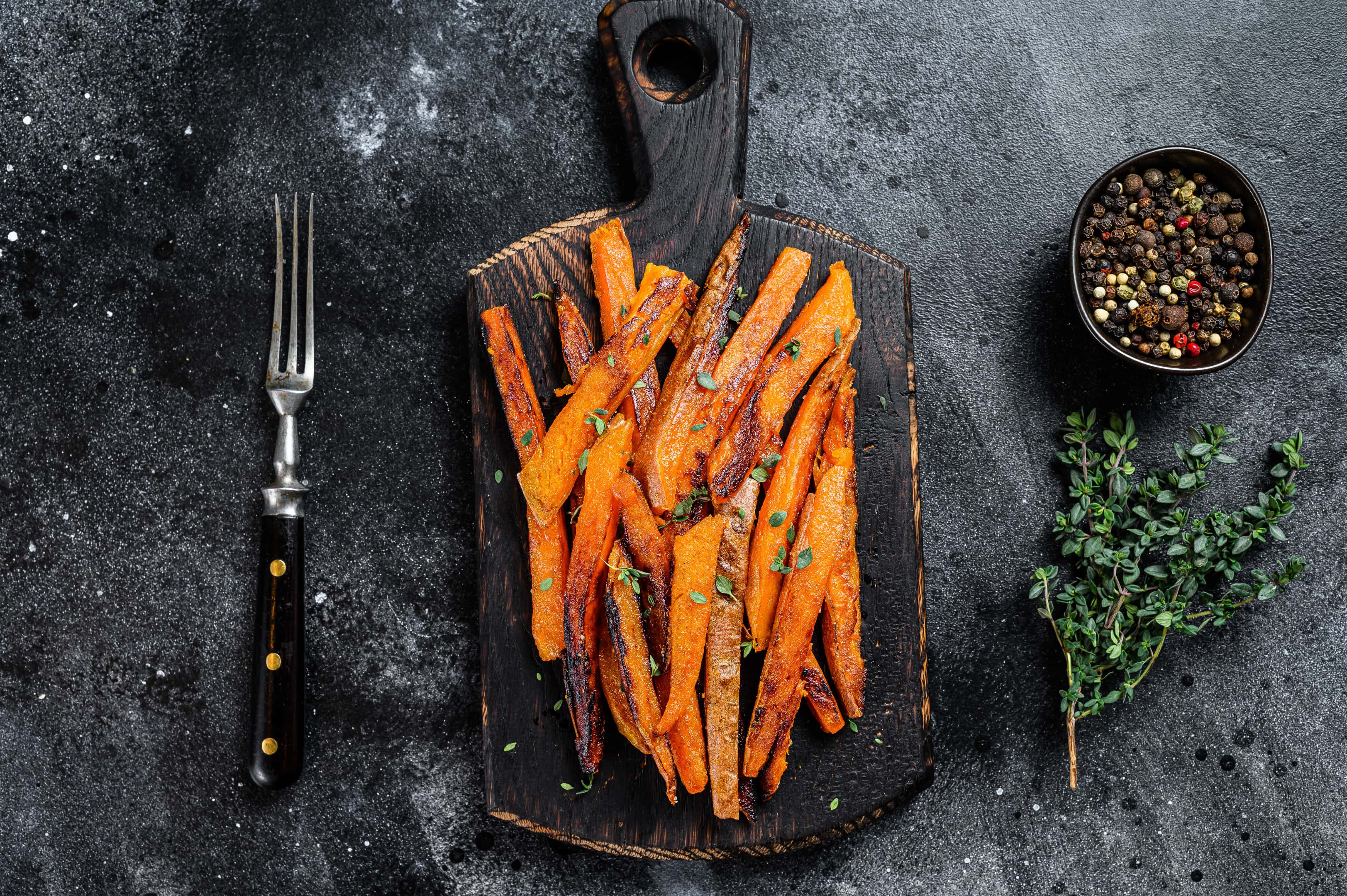
1. Sweet potatoes
Sweet potatoes are one of the best foods for soothing eczema due to the many nutrients that they have. They are high in beta-carotene, a compound that the body converts into vitamin A. Vitamin A offers different advantages, including skin repair, immune function, and hydration. Low levels of vitamin A in the body can cause inflamed and irritated skin, contributing to the symptoms of eczema.
One key contributor to eczema flare-ups is chronic inflammation, and sweet potatoes can help alleviate inflammation with their high levels of polyphenols and anthocyanins. These powerful antioxidants help to eliminate free radicals that contribute to skin irritation.
2. Spinach
Spinach is an excellent source of vitamin C, which is beneficial for the synthesis of collagen, a protein that promotes skin elasticity and strength. Vitamin C also helps repair damage to the skin and protects against oxidative stress that can make eczema symptoms worse. Additionally, spinach is rich in iron and folate, both of which are crucial for cell regeneration, which promotes faster healing.
Moreover, spinach is loaded with strong anti-inflammatory compounds, such as kaempferol and quercetin, that help to alleviate itching, swelling, and redness. These antioxidants help soothe eczema flare-ups.
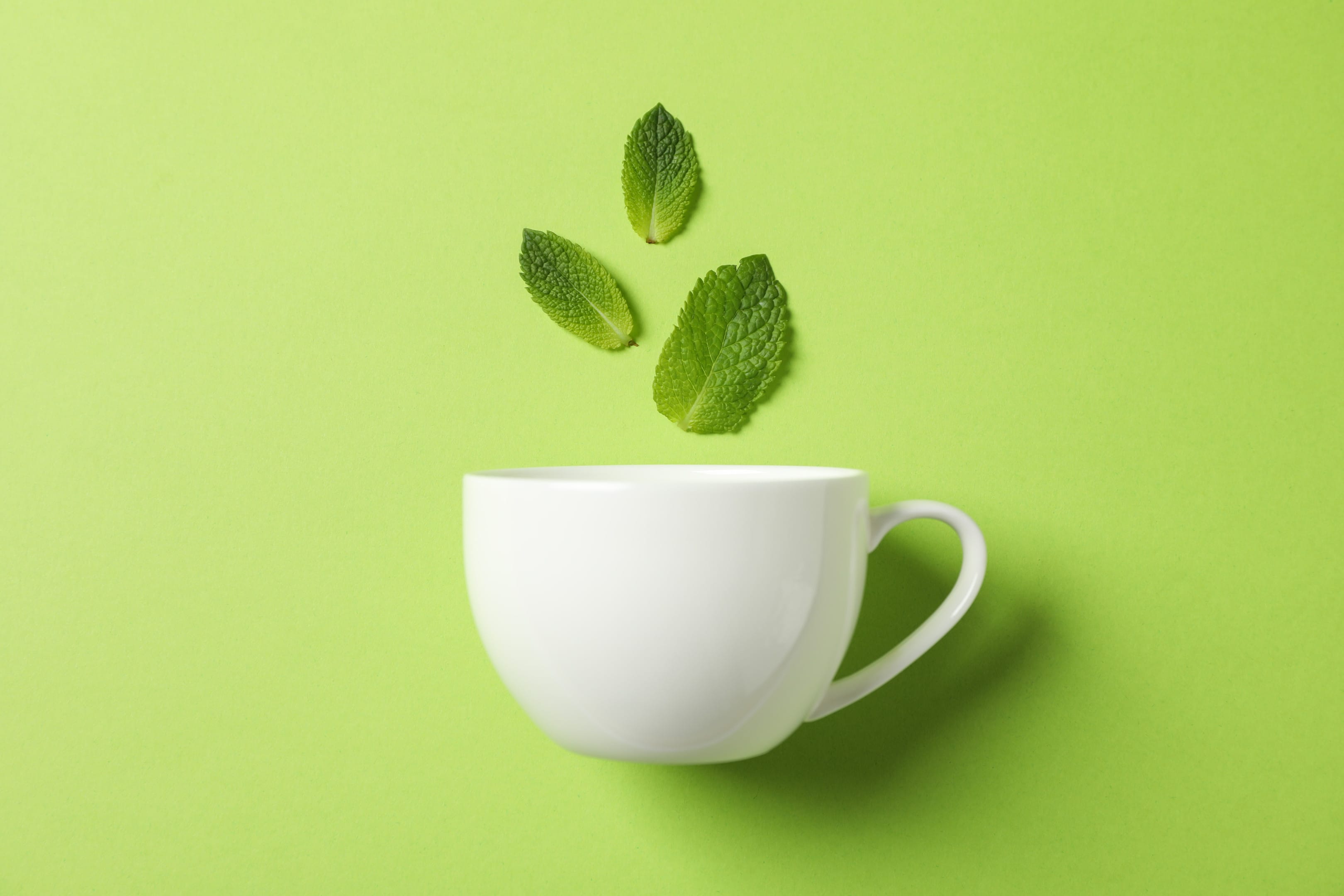
3. Green tea
Green tea is an excellent source of catechins, antioxidants that aid in the elimination of inflammation. These antioxidants help to reduce the risk of cellular damage in the skin, reducing the likelihood of flare-ups. Moreover, green tea contains EGCG (epigallocatechin gallate), whose anti-allergic properties can help prevent the release of histamines that trigger eczema symptoms.
In addition, green tea is loaded with polyphenols, which can aid skin hydration and improve moisture retention. Adequate skin hydration is crucial for the management of eczema, as dry skin can increase the risk of irritation. The anti-inflammatory compounds in green tea can also help to regulate immune response, decreasing overactive immune reactions.
4. Blueberries
Blueberries are rich in antioxidants, such as anthocyanins, that can help combat inflammation and reduce skin damage. Since eczema is fueled by inflammation, consuming blueberries can help reduce swelling and redness. Additionally, blueberries contain flavonoids and polyphenols that boost hydration, preventing dryness and flakiness. This is beneficial for eczema-prone skin, which tends to be dry.
The skin and gut are closely connected, and an unhealthy gut can increase the risk of flare-ups. Blueberries are rich in prebiotic fiber, which aids the nourishment of good gut bacteria, helping to enhance immune response regulation and decrease skin inflammation.
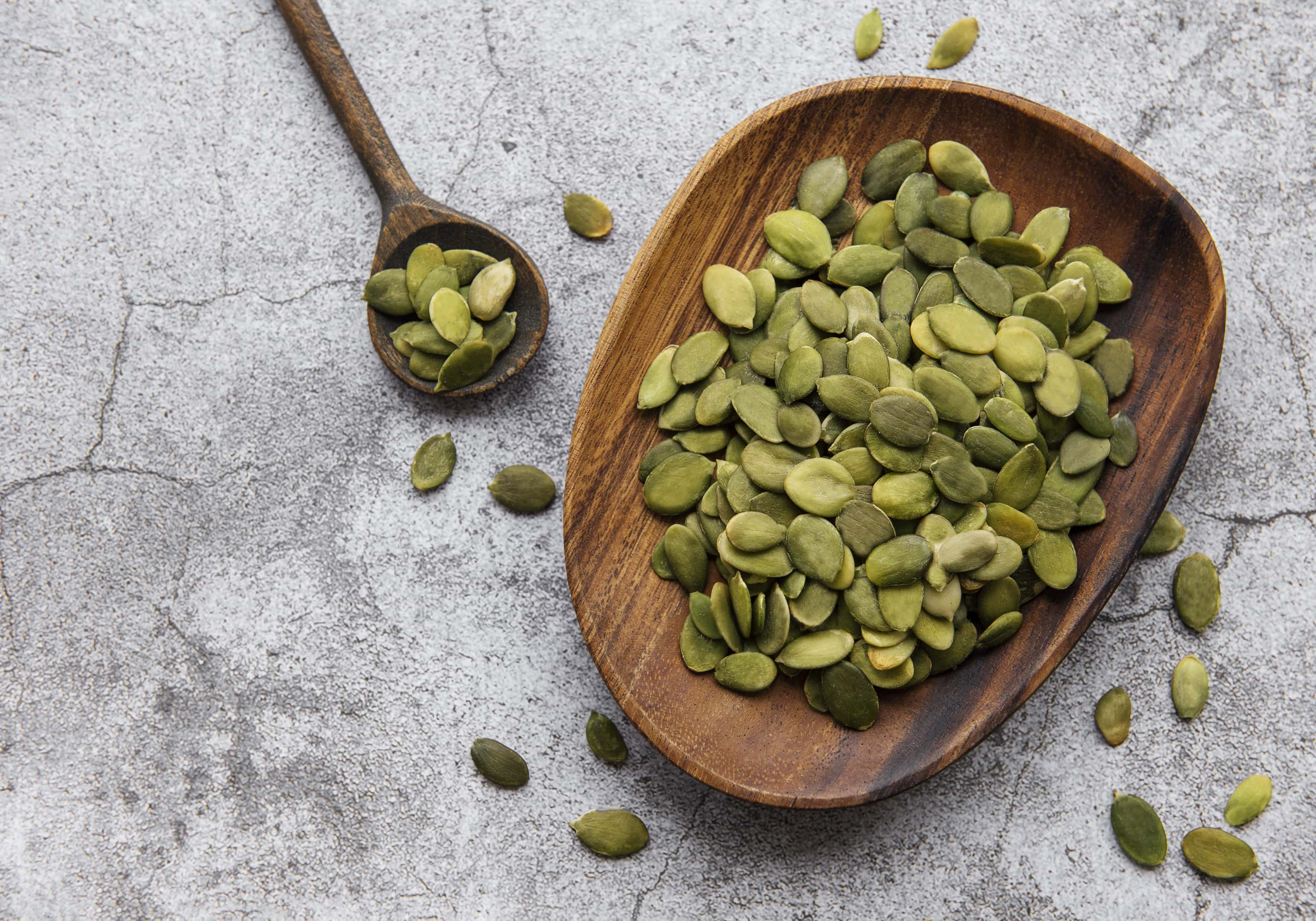
5. Pumpkin seeds
Pumpkin seeds are a potent anti-itch food for eczema relief. They are rich in zinc, which supports the healing of damaged skin and enhances the skin’s barrier to keep irritants away. Moreover, an adequate intake of foods high in zinc, like pumpkin seeds, can aid the alleviation and prevention of eczema.
Pumpkin seeds also contain a high amount of vitamin E, which supports moisture retention and prevents skin from becoming flaky. Vitamin E is particularly important for promoting the healing of skin affected by eczema. In addition, pumpkin seeds contain good amounts of magnesium, which can help relax the skin and alleviate the itching that often comes with eczema.
6. Mackerel
Mackerel is a nutrient-dense fish that offers powerful skin-healing advantages. It contains omega-3 fatty acids that aid in the reduction of inflammation. Omega-3 fatty acids help to decrease redness, soothe itching and irritation, and enhance the skin barrier to prevent the loss of moisture. Mackerel also contains coenzyme Q10 and selenium, which help protect the skin from damage and reduce eczema symptoms.
In addition, mackerel is high in vitamin D, which plays an important role in skin cell growth and immune system regulation. Vitamin D can help reduce skin sensitivity, strengthen the skin’s defense against irritants, and aid in the healing of eczema.
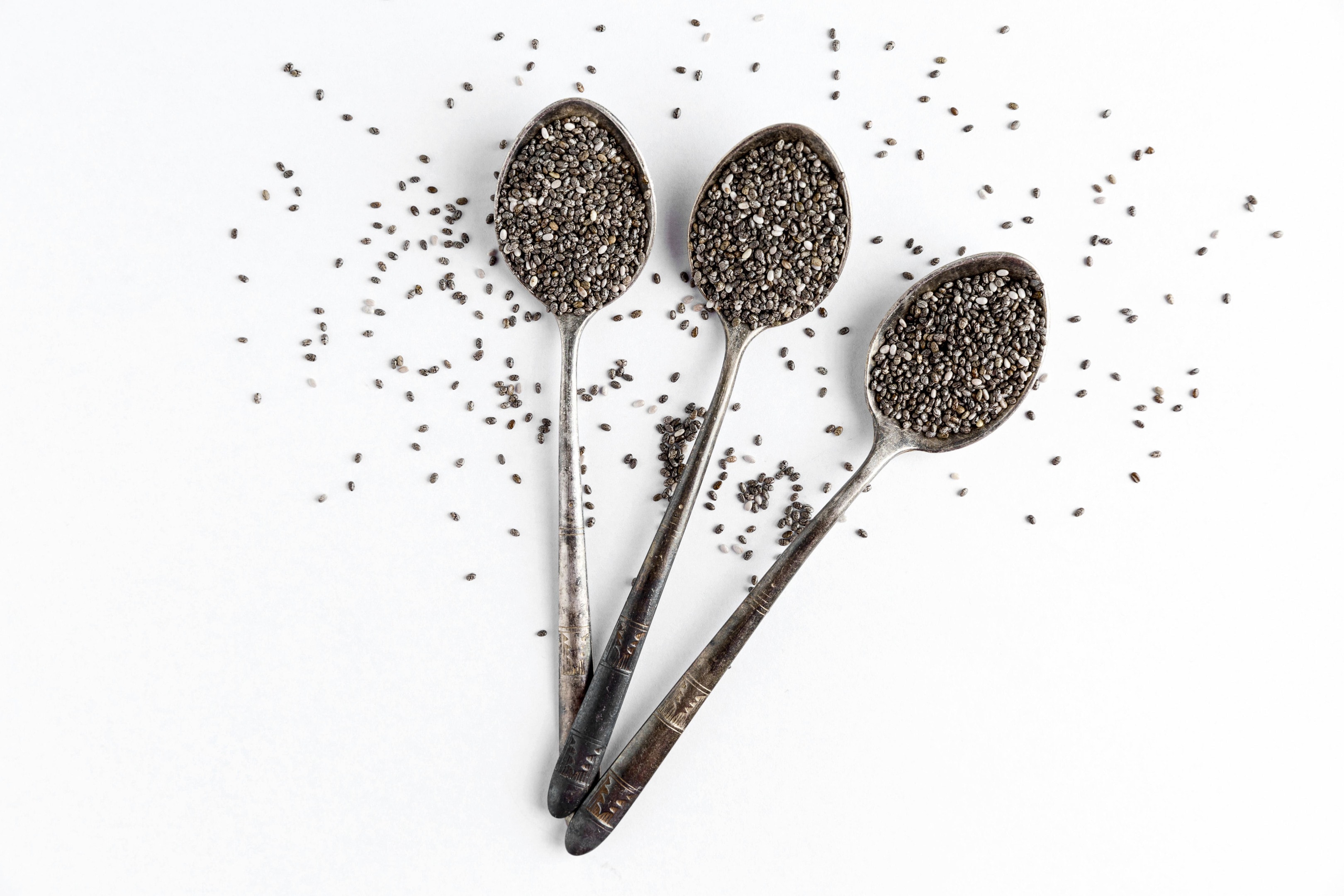
7. Chia seeds
Chia seeds are packed with antioxidants such as chlorogenic acid and quercetin, which can protect against skin damage. These antioxidants help reduce inflammation and free radical damage that can make eczema worse, offering skin protection and supporting its natural healing process. Chia seeds also contain good amounts of protein and amino acids that promote collagen production, supporting skin elasticity.
Gut health plays a major role in the management of eczema, as a balanced gut microbiome aids the regulation of immune responses. Chia seeds are high in insoluble fiber, which supports digestion and nourishes good gut bacteria. A healthy gut can help decrease systemic inflammation, leading to fewer occurrences of eczema symptoms.
8. Turmeric
Derived from the root of the Curcuma longa plant, turmeric is a powerful soothing food for eczema. It contains curcumin, which can hinder the production of pro-inflammatory cytokines and enzymes, which are the culprits behind eczema flare-ups. By decreasing inflammation, turmeric can help decrease redness and soothe irritated skin.
Another reason to add turmeric to your diet is its dense composition of numerous antioxidants that protect the skin from oxidative stress and slow down the aging process. Additionally, turmeric possesses natural antihistamine qualities that can reduce the release of histamine, easing the intense discomfort of itching associated with eczema.
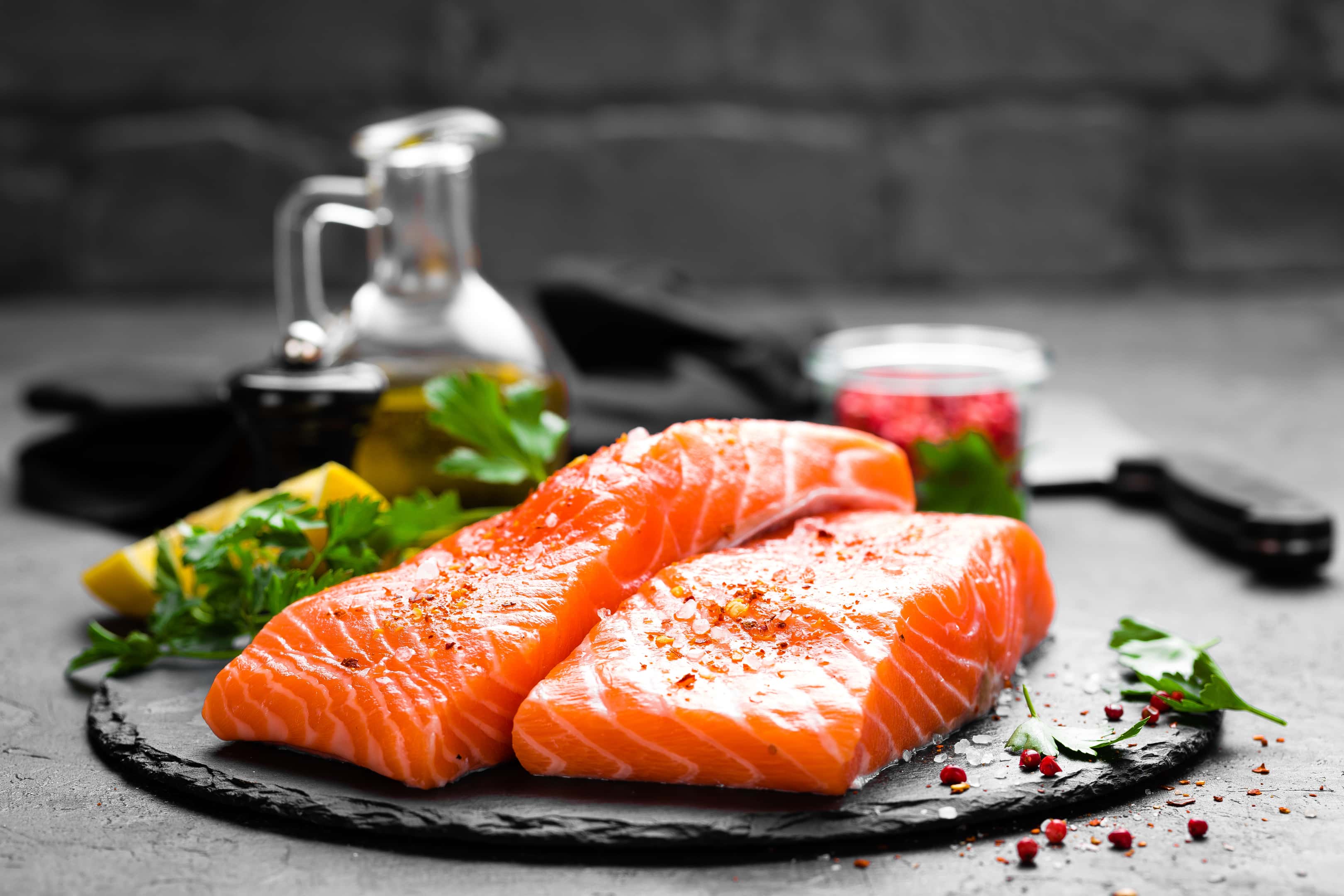
9. Salmon
Salmon contains significant amounts of vitamin D, making it a beneficial food for reducing and alleviating eczema symptoms. Vitamin D aids in strengthening the skin barrier and preventing the loss of moisture and irritation. Consuming salmon regularly can naturally help to boost the levels of vitamin D in the body, helping to enhance the skin’s defense against eczema triggers.
In addition, salmon is high in protein, a nutrient important for skin repair and regeneration. Protein helps to rebuild cells, improve collagen production for healthier skin, and prevent skin from cracking. Salmon is particularly beneficial for repairing skin damaged by eczema.
10. Kimchi
Kimchi is packed with probiotics, which are beneficial bacteria that enhance gut health. Studies have shown that there is a strong link between gut health and skin conditions like eczema. Consuming kimchi can help balance the immune system, decrease inflammation in the gut, and boost skin defense. The Lactobacillus strains present in kimchi can help improve symptoms of eczema by aiding gut health.
Furthermore, kimchi promotes liver detoxification and function, which helps the body get rid of toxins that might trigger symptoms of eczema. A healthy liver means that there are fewer toxins in the body, resulting in less inflammation and clearer skin.
Conclusion
To soothe the itching associated with eczema, it is important to consume foods that are packed with beneficial nutrients and antioxidants like zinc, omega-3 fatty acids, selenium, quercetin, and vitamins E, A, D, and C. These nutrients can help nourish the skin from within and provide relief. Incorporate anti-itch foods like sweet potatoes, blueberries, turmeric, green tea, kimchi, and chia seeds into your diet to reduce eczema flare-ups and improve your skin’s condition.






